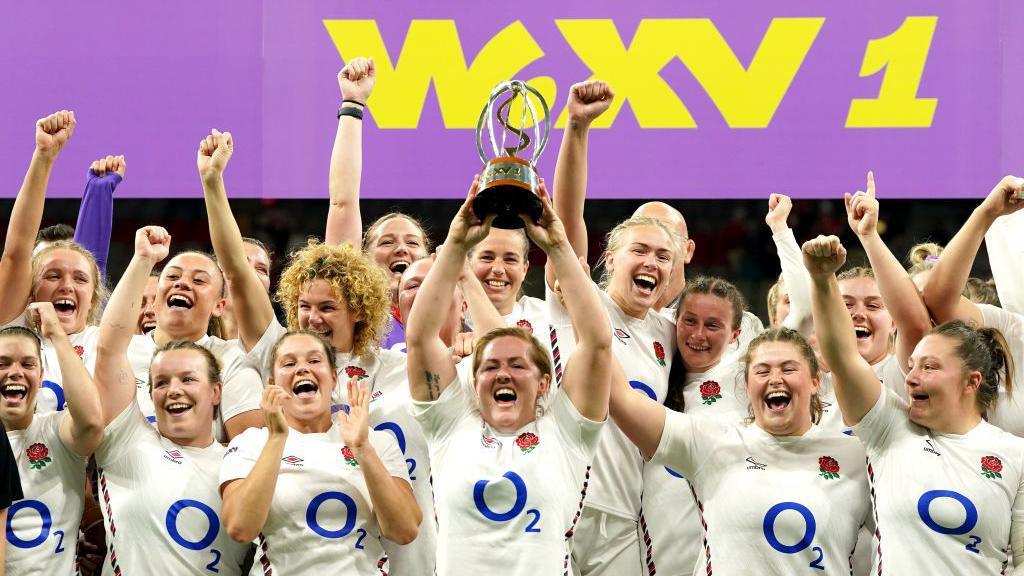Women's home nations gain control of autumn games

England defeated the United States, New Zealand and Canada to win WXV1 last year in Vancouver
- Published
England, Scotland, Ireland and Wales have gained control of their autumn fixtures as part of World Rugby's alterations to the women's global calendar.
The new WXV Global Series, which will replace the WXV competition, will run from 2026-2028 and feature the top 12 teams in the world.
Seeking to build on the success of the Women's Rugby World Cup in England, national federations and unions will be able to choose their own home and away games in September and October.
Alongside each of the home nations, Australia, Canada, France, Italy, Japan, New Zealand, South Africa and the United States qualify as the top 12 sides.
Those 12 nations are locked in to the WXV Global Series until the next Rugby World Cup in 2029.
Each side will receive the same amount of money from World Rugby to compete in the fixtures no matter how many Tests they choose to play.
Fixtures will be announced by each nation after the World Cup.
"This is really important in the context of [breakaway league] R360 and other competitions that are being discussed as we need to give the national federations, players and fans certainty," World Rugby chief executive Alan Gilpin said.
"This allows that certainty over a four-year cycle that allows the national federations and unions to go and have those conversations [on contracts] with the player groups. It is a really important milestone."
Teams ranked 13-18, who World Rugby describe as facing greater "financial challenges", will play their fixtures in a single destination in 2026 and 2028, funded by the global governing body.
Those teams are Brazil, Fiji, Hong Kong China, the Netherlands, Samoa and Spain.
This means WXV - a three-tier competition introduced in 2023 to supply more meaningful games before the World Cup - will no longer run.
BBC Sport understands the top 12 sides will play between 9-16 Tests on the WXV Global Series, outside of World Cup years, with a maximum of six Tests every September and October. This is in addition to their already established regional competitions like the Women's Six Nations.
The total of games will include fixtures played by home nations in 2027 when they also provide players for the first British and Irish Lions women's tour to New Zealand.
World Rugby says there will be over 100 games across the three-year Global Series competition and £9m will be invested, which is hoped will build on the World Cup in England that has seen record viewing figures and the final at Twickenham on 27 September sold out.
"The launch of the WXV Global Series marks another landmark moment for the women's game, following what will be an era-defining Women's Rugby World Cup in England," World Rugby chairman Brett Robinson added.
"It delivers on our commitment to raise standards, provide consistent and competitive fixtures, a clear international calendar that prioritises welfare, and create sustainable commercial outcomes for the women's game globally."
In 2023, World Rugby announced a new men's competition starting in 2026 made up of 24 teams, split into two divisions.
'Space for women's rugby to build its own narratives' - analysis
Unions that have invested in their women's teams deserve control over fixtures and the chance to grow their fanbase.
Losing the WXV trophies may weaken narratives, but it also creates space for women's rugby to build its own – like a Hillary Shield (awarded to the winner of England against New Zealand) or Ella-Mobbs Cup (awarded to the winner of England against Australia).
Last year's WXV struggled for crowds with local organisers saying that just under 4,000 people attended across the opening triple-header day, which included hosts Canada's win over France, England's win over the United States and Ireland's upset of world champions New Zealand.
A crowd of just 291 watched Wales against Australia at WXV2 in South Africa.
The unions will regain power over TV and sponsorship rights as the women's game aims to move towards sustainability and profitability.
The challenge lies with nations less committed to growth. Scotland will have only 15 contracted players from October and may choose the cheapest, minimum schedule.
In Australia, despite hosting the 2029 World Cup, many players juggle jobs that could limit time away from home, unless more full-time options emerge.
The real test of success will be whether every nation invests and engages. The first fixture list should give us an early clue.
England retain WXV1 title with second-half comeback